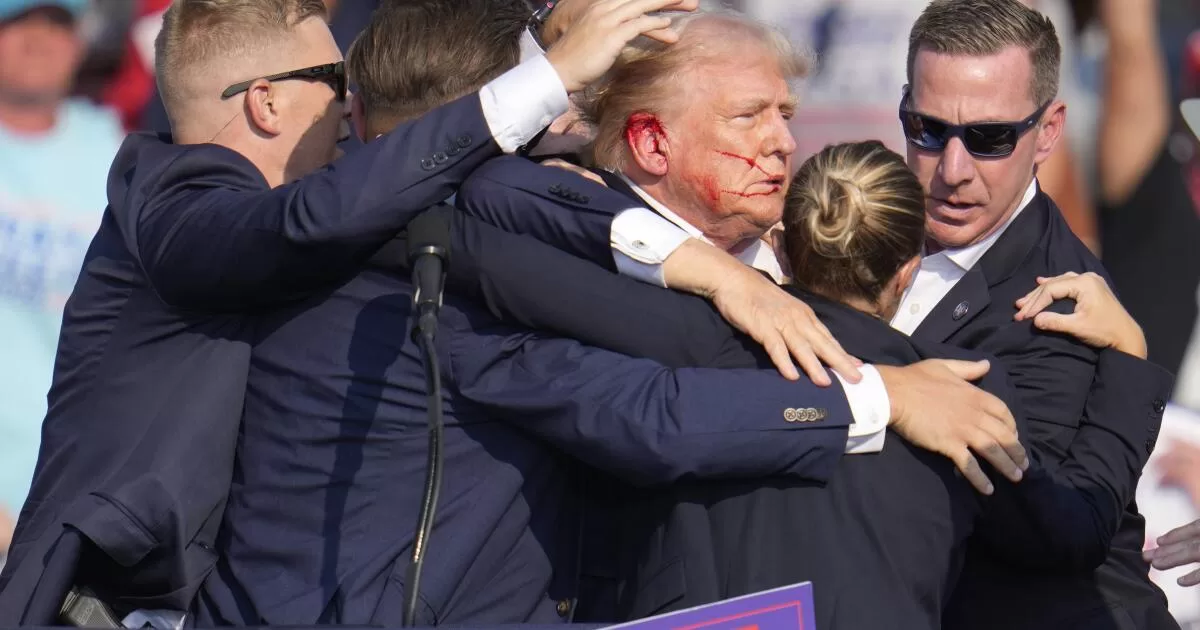Communication breakdowns with local law enforcement hampered the Secret Service’s performance during a July campaign rally where former President Trump was shot and wounded, according to a document released Friday that lays out a litany of missed opportunities to stop a gunman who opened fire from an unsecured roof.
A five-page document summarizing the key conclusions of a yet-to-be finalized report lays bare the cascading and wide-ranging failings that preceded the July 13 shooting at a Butler, Pa., rally at which Trump was injured in the ear.
Those include an absence of clear guidance from the Secret Service to local law enforcement, the failure to fix line-of-sight vulnerabilities at the rally grounds that left Trump open to sniper fire and “complacency” among some agents, said Ronald Rowe Jr., the agency’s acting director.
Though the failed response has been well documented through congressional testimony, news media investigations and other public statements, the summary document released Friday marks the Secret Service’s most formal attempt to catalog the errors of the day and comes amid fresh scrutiny of the agency following Sunday’s arrest of an armed man who authorities say stalked Trump at a Florida golf course.
“This was a failure on the part of the United States Secret Service. It’s important that we hold ourselves to account for the failures of July 13th and that we use the lessons learned to make sure that we do not have another failure like this again,” Rowe said at a news conference accompanying the release of the summary.
The report details a series of “communications deficiencies” before the shooting by 20-year-old Thomas Matthew Crooks, who was killed by a Secret Service sniper after firing eight rounds in Trump’s direction from the roof of a building less than 150 yards from where the candidate was speaking. That building had been identified as a possible hazard before the event, Rowe said, yet officials didn’t take appropriate steps to correct the potential problems.
“Line-of-sight issues were acknowledged, but not properly mitigated. Issues were encountered the day of the visit with respect to line-of-sight concerns, but they were not escalated to supervisors,” Rowe said. “While some members of the advanced team were very diligent, there was complacency on the part of others that led to a breach of security protocols.”
Among the other problems: Some local police at the site were unaware of the existence of two communications centers on the grounds, meaning officers did not know that the Secret Service members were not receiving their radio transmissions.
Law enforcement also relied too heavily on cellphones, instead of Secret Service radio frequencies, to communicate vital information. As officers searched for Crooks before the shooting, details were being transmitted “via mobile/cellular devices in staggered or fragmented fashion” instead of through the Secret Service’s network.
“The failure of personnel to broadcast via radio the description of the assailant, or vital information received from local law enforcement regarding a suspicious individual on the roof of the AGR complex, to all federal personnel at the Butler site inhibited the collective awareness of all Secret Service personnel,” the report said. The acronym refers to AGR International Inc., a manufacturing plant just north of the Butler Farm Show grounds, where the rally was held.
That breakdown was especially problematic for Trump’s protective detail, “who were not apprised of how focused state and local law enforcement were in the minutes leading up to the attack on locating the suspicious subject.” Had they known, the report says, they could have made the decision to relocate Trump while the search for the gunman was in progress.
The report raises more serious questions about why no law enforcement personnel were stationed on the roof Crooks used.
A local tactical team was stationed on the second floor of a building in the complex from which Crooks fired. Multiple law enforcement entities questioned the effectiveness of the team’s position, “yet there was no follow-up discussion” about changing it, the report says. And there was no discussion with Secret Service about putting a team on the roof, even though snipers from local law enforcement agencies “were apparently not opposed to that location.”
The tactical team operating on the second floor of the building had no contact with Secret Service before the rally. That team was brought in by a local police department to help with the event, without Secret Service’s knowledge, the report says.
The Secret Service understood in advance that the rally site, selected by Trump’s staff because it better accommodated the “large number of desired attendees,” was a security challenge because of lines of sight that could be exploited by a would-be attacker. And yet, the report said, no security measures were taken on July 13 to remove those concerns, and the Secret Service lacked detailed knowledge about the local law enforcement support that would even be in place.
The report’s executive summary does not identify specific individuals who may be to blame nor does it indicate whether any staff members have been disciplined, though the Associated Press has previously reported that at least five Secret Service agents have been placed on modified duty. The director at the time, Kimberly Cheatle, resigned more than a week after the shooting, saying she took full responsibility for the lapse.
The Secret Service’s investigation is one of numerous inquiries, including by Congress and a watchdog probe by the Department of Homeland Security’s inspector general office.
Rowe has said the July shooting and Sunday’s episode, in which 58-year-old Ryan Wesley Routh was arrested after Secret Service agents detected a rifle poking through shrubbery lining the West Palm Beach, Fla., golf course where Trump was playing, underscore the need for a paradigm shift in how the agency protects public officials.
Trump, Rowe said, is receiving the “highest levels” of protection, and the Secret Service response in Florida was an example of procedures working as they should.
Santana, Tucker and Richer write for the Associated Press.
